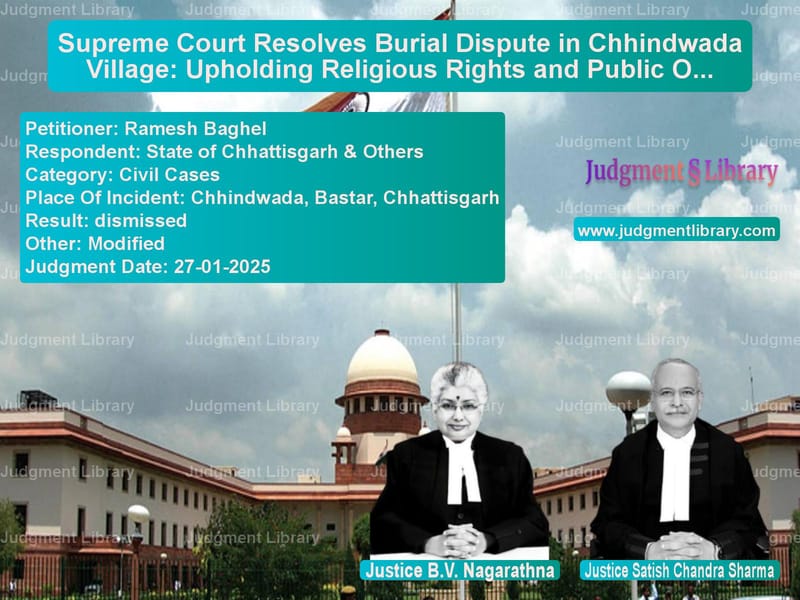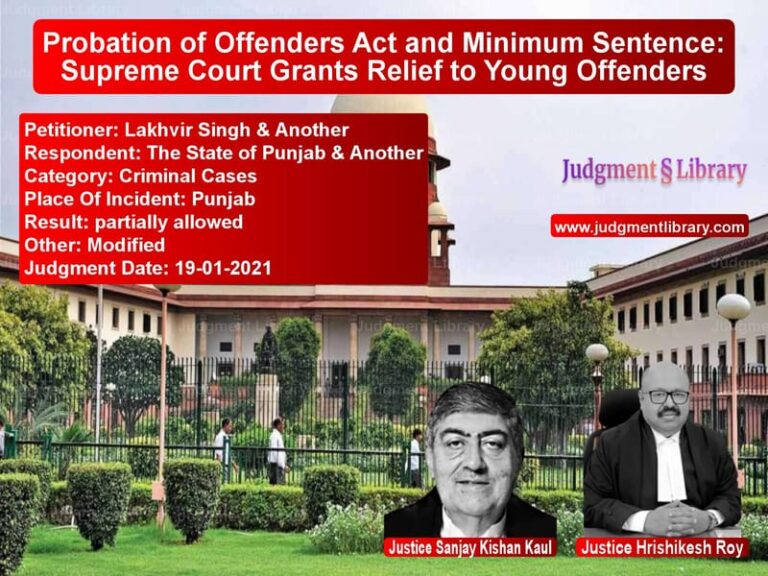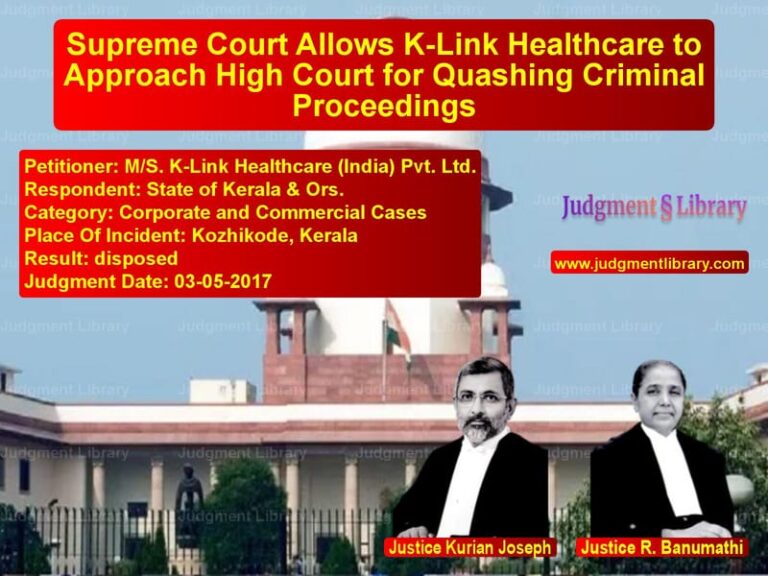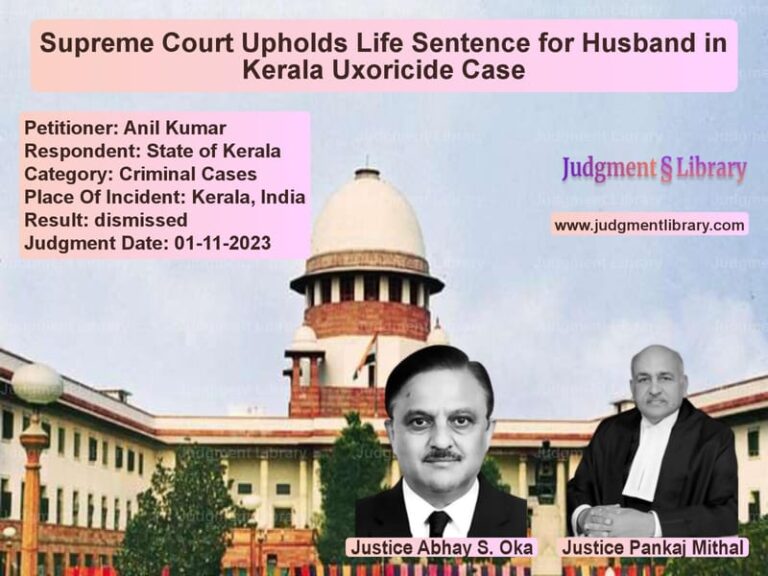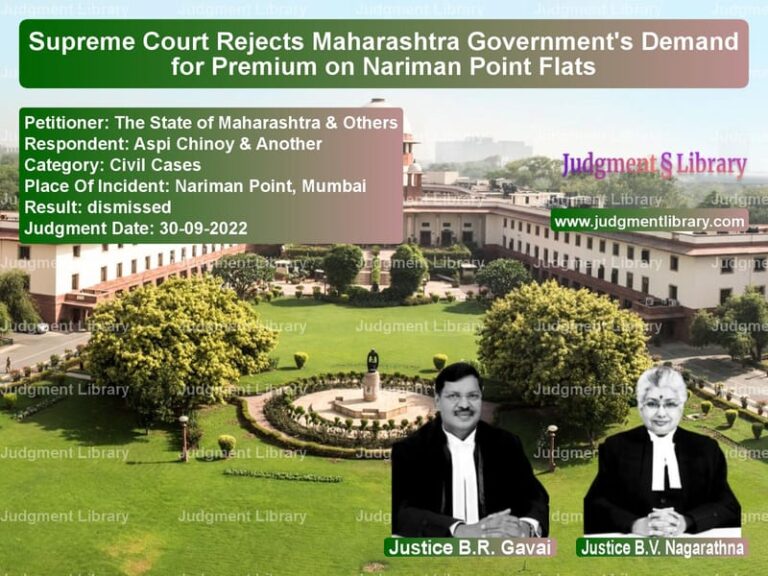Supreme Court Resolves Burial Dispute in Chhindwada Village: Upholding Religious Rights and Public Order
The Supreme Court of India, in a recent judgment, resolved a contentious issue involving the burial of a Christian man in a village that had a history of religiously segregated burial grounds. The case, involving Ramesh Baghel and the State of Chhattisgarh & Others, touched upon significant issues of religious freedom, community practices, and the State’s responsibility to ensure peace and harmony in rural settings. The appellant, a son who sought to bury his father, faced opposition from the local community, which led to a legal battle over the burial site.
The appellant, Ramesh Baghel, had been a victim of his village’s hostile stance towards the burial of his father in the community graveyard designated for Christians. Despite a long-standing practice of Christians being allowed to be buried in a specific section of the village graveyard, local opposition and tensions led to the body being held in the mortuary for several weeks. This delay prompted Ramesh Baghel to approach the Supreme Court, seeking relief and a dignified burial for his deceased father.
Background of the Case
The case began after Ramesh Baghel’s father passed away on January 7, 2025. Following his death, the family planned to bury him in the Christian section of the village’s common graveyard in Chhindwada. However, local opposition emerged, and the villagers prevented the family from proceeding with the burial. The dispute escalated when the family was not only denied access to the graveyard but also threatened by other villagers. Despite the family seeking help from the police and the local authorities, no action was taken.
The family had been living in Chhindwada for generations, and it was customary for the Christian members of the Mahra caste to be buried in a specific section of the village graveyard. Over the years, multiple members of the Christian Mahra community, including the appellant’s grandfather and aunt, had been buried in the same graveyard without any objections. However, in the case of the appellant’s father, the local Gram Panchayat refused to grant permission for the burial, citing opposition from the tribal community.
In response to the escalating situation, Ramesh Baghel filed a writ petition in the High Court of Chhattisgarh, seeking permission to bury his father in the village graveyard. The High Court dismissed his petition, citing concerns over public unrest and the availability of a designated burial ground for Christians in a nearby village, Karkapal.
Key Legal Issues
- The fundamental right of the appellant to bury his father according to his religious customs, as protected under Article 21 and Article 25 of the Constitution of India.
- The conflict between the religious burial practices of the Mahra Christian community and the objections raised by the tribal community in the village.
- The duty of the State and local authorities to ensure the peaceful conduct of religious practices and uphold public order.
- The appropriate location for burial and the issue of religious discrimination in a shared community space.
Arguments of the Parties
Petitioner’s Arguments
The appellant, represented by Senior Counsel Mr. Colin Gonsalves, made the following points:
- The village has a long-standing practice of allowing the Christian Mahra community to use a designated area within the common graveyard for burial. This practice has been followed without any objections for decades.
- It was an infringement of the appellant’s fundamental rights to prevent the burial of his father in the same section of the graveyard where his grandfather and aunt had been buried.
- The appellant sought permission to bury his father in the same graveyard as his ancestors, as the community had previously used this burial site without any issues.
- Additionally, the appellant sought to highlight that the refusal to allow burial was a violation of his family’s religious freedom, which is protected under Articles 21 and 25 of the Indian Constitution.
Respondents’ Arguments
The respondents, represented by the State of Chhattisgarh and local authorities, contended:
- The Chhindwada graveyard is primarily designated for Hindu and tribal burials, and there is no formal recognition of a separate Christian section within the graveyard.
- The appellant and his family should instead use the burial ground at Karkapal, which is specifically designated for the Christian community. This burial ground is about 20-25 kilometers away from the village.
- The respondents argued that allowing the burial in the village graveyard could lead to public unrest and disharmony between the tribal and Christian communities.
- The respondents also emphasized that the Chhattisgarh Gram Panchayat regulations require the use of designated burial sites and cannot allow arbitrary burials outside these designated areas.
Supreme Court’s Observations
The Supreme Court, after considering the arguments from both sides, made the following observations:
“The appellant and his family have every right to bury their deceased family members in a manner that aligns with their faith. The refusal by the villagers to permit this burial in the designated Christian section of the graveyard is a clear violation of the appellant’s fundamental rights. The graveyard has been used for Christian burials for decades without objections, and there is no reason why this practice should be discontinued in the case of the appellant’s father.”
Read also: https://judgmentlibrary.com/supreme-court-upholds-possession-rights-in-karnataka-property-dispute/
The Court also noted that the appellant’s family had been living in the village for generations, and their religious practices had been peacefully coexisting with other community practices for decades. The Court acknowledged that the issue of burial rights should not lead to social unrest or discrimination.
Final Judgment and Directions
The Supreme Court ruled in favor of the appellant, with the following directions:
- The appellant was granted permission to conduct the burial of his father in his private agricultural land at village Chhindwada.
- The respondents were directed to provide all necessary logistical support, including transportation of the body from the mortuary to the burial site, as well as adequate police protection to ensure peace during the burial.
- The State was directed to demarcate and establish exclusive burial sites for the Christian community in the State of Chhattisgarh to avoid similar disputes in the future. This process was to be completed within two months.
- The respondents were instructed to take all necessary steps to ensure that no public order incidents occur during the burial, and the family was assured of protection from any interference or threats from the local community.
Implications of the Judgment
This ruling reaffirms the importance of respecting religious freedom and the right to perform last rites according to one’s customs. It also underscores the State’s responsibility to maintain public order while ensuring that minority communities are not discriminated against or deprived of their fundamental rights.
Conclusion
The Supreme Court’s judgment in Ramesh Baghel v. State of Chhattisgarh & Others provides a critical precedent for balancing religious rights with public order concerns. The ruling affirms the need for the State to provide designated spaces for all communities to conduct their religious ceremonies, thereby fostering a more inclusive and harmonious society.
Petitioner Name: Ramesh Baghel.Respondent Name: State of Chhattisgarh & Others.Judgment By: Justice B.V. Nagarathna, Justice Satish Chandra Sharma.Place Of Incident: Chhindwada, Bastar, Chhattisgarh.Judgment Date: 27-01-2025.
Don’t miss out on the full details! Download the complete judgment in PDF format below and gain valuable insights instantly!
Download Judgment: ramesh-baghel-vs-state-of-chhattisgar-supreme-court-of-india-judgment-dated-27-01-2025.pdf
Directly Download Judgment: Directly download this Judgment
See all petitions in Contract Disputes
See all petitions in Damages and Compensation
See all petitions in Workplace Harassment
See all petitions in Judgment by B.V. Nagarathna
See all petitions in Judgment by Satish Chandra Sharma
See all petitions in dismissed
See all petitions in Modified
See all petitions in supreme court of India judgments January 2025
See all petitions in 2025 judgments
See all posts in Civil Cases Category
See all allowed petitions in Civil Cases Category
See all Dismissed petitions in Civil Cases Category
See all partially allowed petitions in Civil Cases Category

